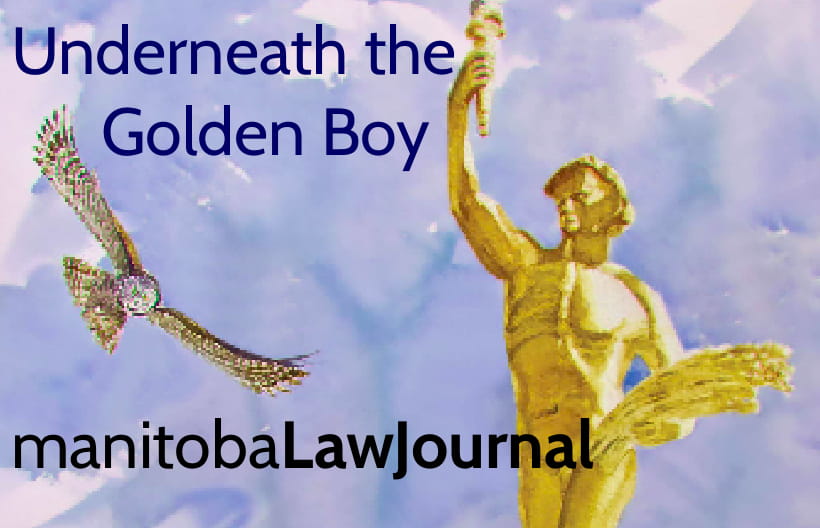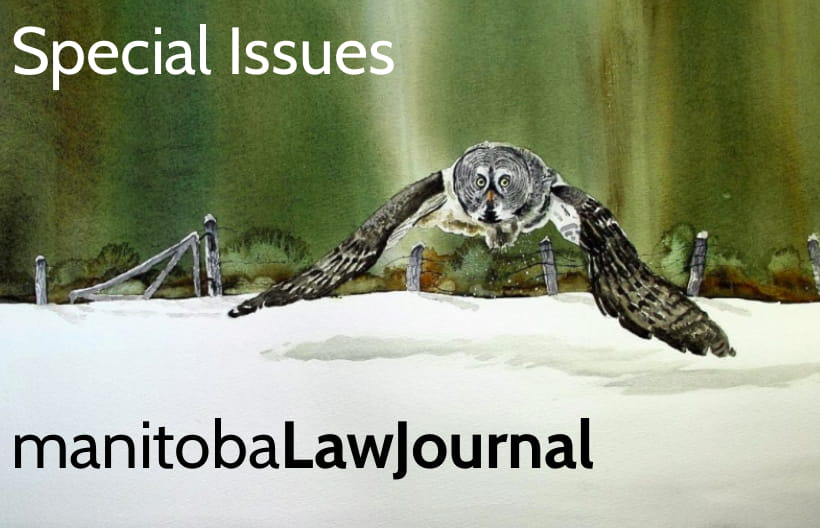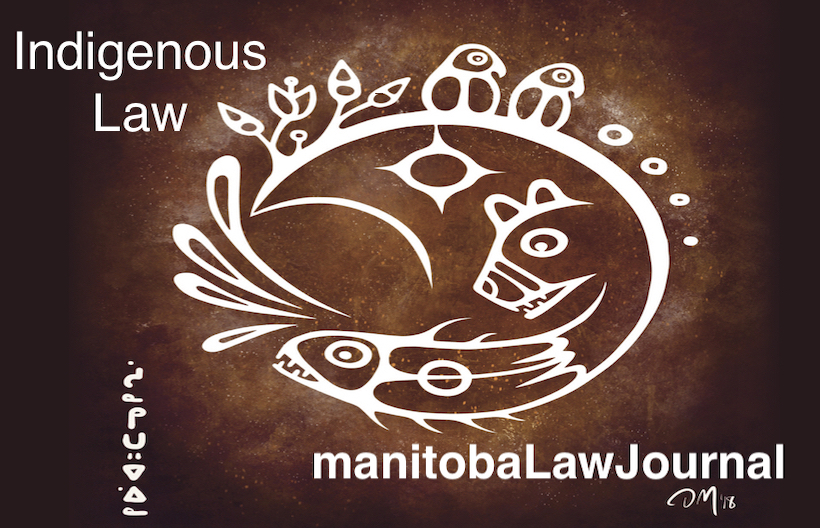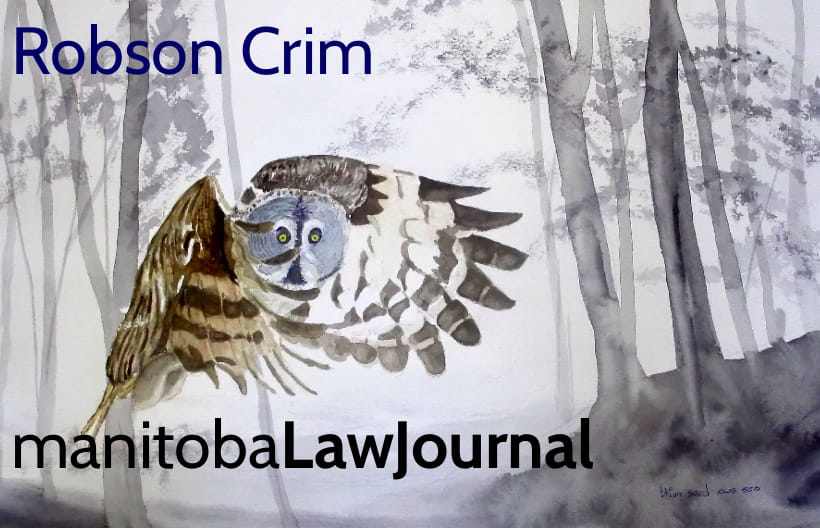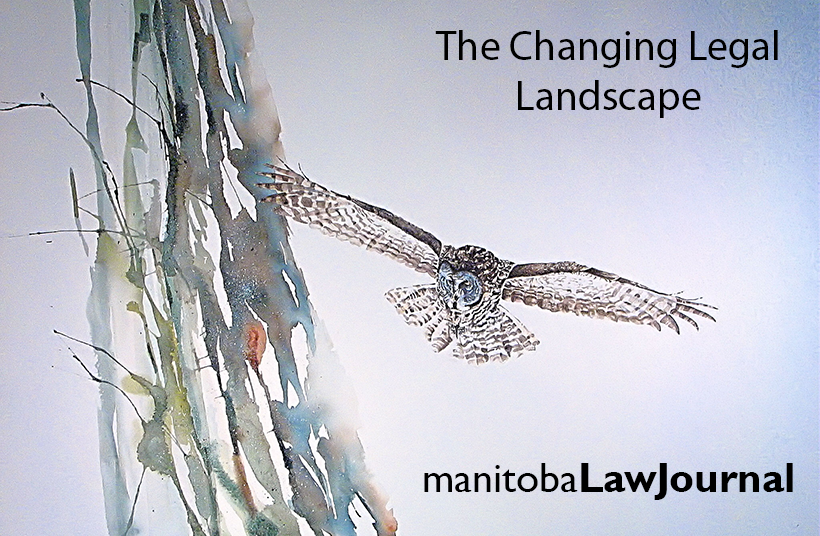About
Open access law journal.
Download articles for free on this website, on CanLII, Google Play, and on The University of Alberta's Open Journal System. Content is also carried on Amazon , LexisNexis Quicklaw Advance, Westlaw Next and HeinOnline.
Peer reviewed content.
MLJ bibliometrics, ranking and letters of support.
MLJ citations in decisions of the Supreme Court of Canada.
Recognition from the Social Sciences and Humanities Research Council.
We serve our community.
The Manitoba Law Journal (MLJ) is a peer-reviewed journal founded in 1961. The MLJ's current mission is to provide lively, independent and high caliber commentary on legal events in Manitoba or events of special interest to our community.
The MLJ aims to bring diverse and multidisciplinary perspectives to the issues it studies, drawing on authors from Manitoba, Canada and beyond. Its studies are intended to contribute to understanding and reform not only in our community, but around the world.
The MLJ has seven dimensions, each with its own regular special issues. These are:
- The Current Legal Landscape: developments in courts and tribunals;
- Underneath the Golden Boy: developments in legislation and on parliamentary and democratic reform;
- Robson Crim: examination of the social dimensions of criminal law;
- The Legal Profession: including histories of major developments and figures in Manitoba law, and the rapid evolution of legal practice;
- The Interdisciplinary Journal of Indigenous Inaakonigewin: uniting scholars, community leaders and artists who have an interest in Indigenous law and remedies for justice;
- The Review of Enterprise and Trade Law: previously known as the Asper Review and the Desautels Review. This merged journal focuses on developments in enterprise and trade law;
- Sports and the Law: developments in sports law
The MLJ is funded by the SSHRC grants in aid of scholarly publications, with additional support from the Legal Research Institute of the University of Manitoba, the Faculty of Law Endowment fund.
Since 1993

UTGB: An annual issue on legislation and public policy
Special Issues: Past, present and future of the Manitoba legal profession
Indigenous Law special issues - Inaugural special issue released in the fall of 2018
Robson Crim: Annual developments of Canadian criminal law
The Current Legal Landscape - annual issues that explore the latest major developments Manitoba's in courts and tribunals
Our Mission
In 2013, the Manitoba Law Journal obtained its first-ever Social Sciences and Humanities Research Council grant. Since then, further strides have been taken, including incorporating an annual special issue on Criminal Law, producing special issues on legal history and pioneering the introduction of the Journal to cyberspace, including publishing its first e-book version, upgrading its website, and posting its content on more free-access websites. The Manitoba Law Journal’s overall vision is now:
- to encourage and publish material that is of scholarly depth, precision and independence, and at the same time readable and engaging;
- to focus on issues that are particularly relevant to our own population in Manitoba. We recognize that we have a diverse society that includes Indigenous peoples, longstanding residents and recent immigrants, and that Manitoba’s economy ranges from the traditional to the hyper-modern;
- to welcome thoughtful work from across the philosophical and political spectrums; the academy must be a forum for searching exploration and debate, not the mere repetition of orthodoxy of any kind;
- to encourage the application of ideas from other jurisdictions in Canada and around the world;
- to ensure that our insights into our own society contribute to understanding at the national and international levels;
- to embrace all useful methodologies, including traditional legal argument, social sciences, and work of an empirical or statistical nature;
- to support the investigation of issues through means that include interviews with active participants, as well as the review of documents; the techniques of responsible journalism should not be alien to law journals;
- to welcome contributors from all backgrounds, including practising lawyers, judges, academics, and authors who are experts in a wide variety of disciplines apart from law;
- to study the past, the present and the future. We have published special issues that have recovered and reflected on the lives and contributions of outstanding jurists; we seek to ensure that our volumes are produced quickly enough to reflect current events; the Journal is also a forum for predictions and prescriptions about the future;
- to follow the recommendations of The Truth and Reconciliation Commission with respect to legal education. In fact, the next Special Issue of the Journal will be focused on Indigenous Peoples and Oral History, and will include career retrospectives by the first wave of Indigenous jurists to attend law school and go on to practice.
A more in depth description of the MLJ's mission statement can found in the various UTGB prefaces, compiled here, as well as the preface in volume 35 issue 1 of the MLJ, which can be downloaded here.
MLJ content is open source (freely available without charge to the user) on this website, Google Play, and on CanLII. MLJ content is also carried on LexisNexis Quicklaw Advance, Westlaw Next, and HeinOnline and included in the annual rankings of law journals by the leading service, the Washington and Lee University annual survey.

